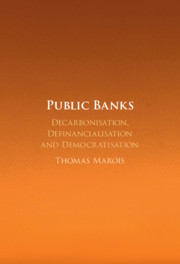Book contents
- Public Banks
- Public Banks
- Copyright page
- Dedication
- Contents
- Figures
- Tables
- Boxes
- Abbreviations
- Introduction
- 1 The World of Public Banks
- 2 Contrasting Evidence, Contending Views
- 3 Credible Legacies, Neoliberal Transition
- 4 Decarbonisation
- 5 Definancialisation
- 6 Democratisation
- 7 A Democratised Public Bank for a Green and Just Transition
- 8 Epilogue
- References
- Index
5 - Definancialisation
Published online by Cambridge University Press: 21 May 2021
- Public Banks
- Public Banks
- Copyright page
- Dedication
- Contents
- Figures
- Tables
- Boxes
- Abbreviations
- Introduction
- 1 The World of Public Banks
- 2 Contrasting Evidence, Contending Views
- 3 Credible Legacies, Neoliberal Transition
- 4 Decarbonisation
- 5 Definancialisation
- 6 Democratisation
- 7 A Democratised Public Bank for a Green and Just Transition
- 8 Epilogue
- References
- Index
Summary
Chapter 5 argues that the definancialisation functions of the Indian National Bank for Agriculture and Rural Development (NABARD) and the American Bank of North Dakota (BND) help these institutions persist as credible public banks in their class-divided societies. As with decarbonisation so too with definancialisation. Contradictions arise and struggles endure over who benefits from what public banks do. Public banks can shield workers, the poor and marginalised, micro-, small-, and medium-sized enterprises (MSMEs), the public sector, and spatial regions (rural/urban) from the discipline of financialised market imperatives. Public banks can similarly shield finance capital, the wealthy and privileged, large financial and non-financial corporations, and even the financial world market from these same financial imperatives, entrenching their unequal power over social reproduction.
Keywords
- Type
- Chapter
- Information
- Public BanksDecarbonisation, Definancialisation and Democratisation, pp. 147 - 185Publisher: Cambridge University PressPrint publication year: 2021

